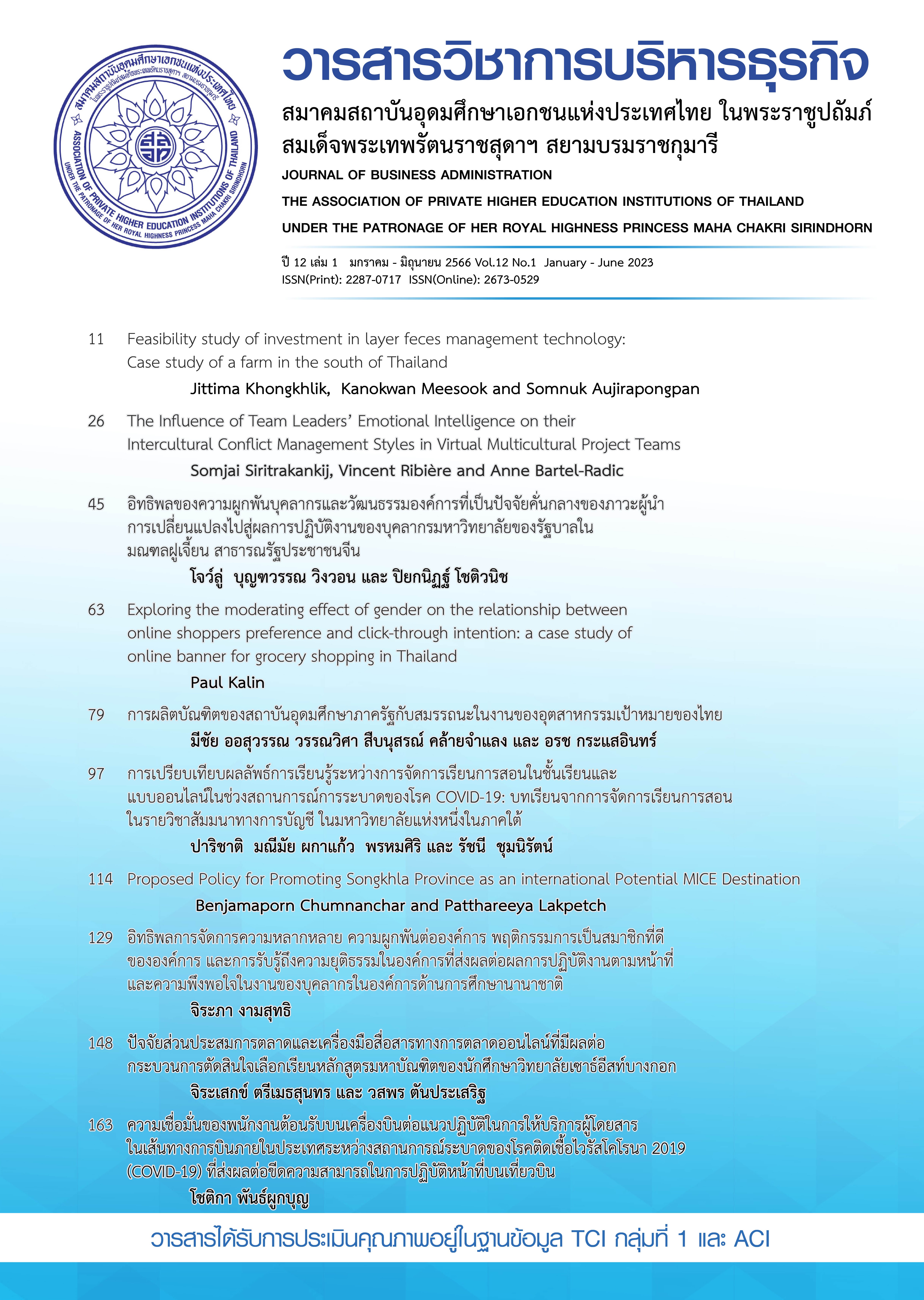Learning Outcomes Comparison between Onsite- and Online- Learning during COVID-19 Pandemic: The Lessons Learned from Teaching and Learning Practices in the Seminar in Accounting Course at One University in Southern Thailand
Keywords:
On-site Learning, Online Learning, Learning Outcomes, Coronavirus Disease (COVID-19) PandemicAbstract
The objective of this study was to compare learning outcomes of students following the Seminar in Accounting Course between two types of instructional methods, namely onsite and online learning approaches under Coronavirus Disease (COVID-19) Pandemic. Data were collected from 189 students, who enrolled in the Seminar in Accounting course during the 2020-2021 academic year. They were divided into 2 groups: The first group consisted of 91 students from onsite instructional approach in semester 1/2020 and the second group consisted of 98 students from online instructional approach in semester 1/2021. Both of 2 types in on-site and online learning groups were controlled by variables in terms of years of study, grade point average, student technological competencies, class size, learning activities, and assessment methods. This study gathered the learning outcomes, which were measured by overall course scores and students perceived learning outcomes, which were collected via questionnaire. Data were analyzed by using independent sample t-test.The results showed that total mean score of learning outcomes from the two types of instructional approaches were not statistically significantly different at 0.05 level. The mean of total course score of onsite type classroom was 85.13/100, while the mean of online type classroom was 82.32/100. Consistently, learning outcomes perceived by students participated in the onsite type of classroom was 4.42/5, whereas the mean of the online type was 4.49/5. Findings of this study indicated that the online and onsite teaching approaches seem to have equally effectiveness for learners in achieving expected learning outcomes of the Seminar in Accounting Course.
References
Afzal, S., Din, M., & Malik, H. D. (2022). Preference determines performance: comparative analysis of students’ preference of on-campus and online learning and their academic performance during covid-19. International Journal of Distance Education and E- Learning (IJDEEL), 7(2), 64-79.
Bachelor of Accountancy Program. (2021). Programme Specification. https://cm.trang.psu.ac.th/course/bachelor-degree/accounting [in thai]
Biggs, J. B., & Tang, C. (2007). Teaching for quality learning at university (3rd ed.). McGraw Hill Education.
Chen, C., & Jones, K. (2007). Blended learning vs. traditional classroom settings: Assessing effectiveness and student perceptions in an MBA accounting course. The Journal of Educators Online, 4(1), 1-15.
Chen, C. C., Jones, K. T., & Moreland, K. (2010). Distance education in a cost accounting course: Instruction, integration, and multiple measures of learning outcomes. Journal of Educators Online, 7(2), 1-20.
Cleaveland, M. C., Dutcher, C., & Epps, K. (2015). Comparing Business Law in online and face-to-face formats: A difference in student learning perception. Academy of Educational Leadership Journal, 19(1), 123-134.
Faidley, J. (2018). Comparison of learning outcomes from online and face-to-face accounting courses. Electronic Theses and Dissertations. Paper 3434. https://dc.etsu.edu/etd/3434.
Grossman, A. M., & Johnson, L. R. (2015). Faculty perceptions of online accounting coursework. American Journal of Business Education (AJBE), 8(2), 95-106.
Holmes, C. M., & Reid, C. (2017). A comparison study of on-campus and online learning outcomes for a research methods course. The Journal of Counselor Preparation and Supervision, 9(2), 15.
Hue Dung, D. T. (2020). The advantage and disadvantage of virtual learning. Journal of Research & Method in Education, 10(2), 45-48.
Mondal, S., & Culp, D. (2017). Title: Academic performance in online versus blended classes in principles of economics and statistics courses. The Journal of Applied Business and Economics. 19(3), 117-135.
Packmohr, S., & Brink, H. (2022). Comparing online and on-campus students’ perceptions of the digitalization of higher education institutions. In HEAd’22 (pp. 575-582). Editorial Universitat Politècnica de València.
Panigrahi, R., Srivastava, P. R., & Sharma, D. (2018). Online learning: Adoption, continuance, and learning outcome—A review of literature. International Journal of Information Management, 43, 1-14.
Phattanawasin, P., Toyama, O., Rojanarata, T., Laopoonpat, P., Pochanakom, K., Limmatvapirat, C., Sukonpan, C., Nantanakorn, P., & Niratisai, S. (2021). Students’ Perspectives and Achievements toward Online Teaching of Medicinal Chemistry Courses at Pharmacy School in Thailand During the COVID-19 Pandemic. Journal of Chemical Education, 98, 3371-3378. [ in Thai ]
Porter, A. L., Pitterle, M. E., & Hayney, M. S. (2014). Comparison of online versus classroom delivery of an immunization elective course. American Journal of Pharmaceutical Education, 78(5), 1-9.
Ramnarayanan, R., Berenson, M. L., & Oppenheim, A. J. (2016). A comparison of student learning in a business statistics course using courseware assisted, traditional, and mixed assessment methods. Academy of Business Research Journal, 1, 25-49.
Sasow, P., Yuennan, C., & Peansungnern, N. (2020). Learning and teaching online in nursing education during the Covid-19 pandemic. Journal of Health and Nursing Education, 26(2), 189-202.
Stack. S. (2015). Learning outcomes in and online vs traditional course. International Journal for the Scholarship of Teaching and Learning, 9(1), 1-20.
Thammetha, T. (2014). E-learning from theory to practice. Sahamitr Printing and Publishing Co.Ltd. [ in Thai ]
Tirasriwat, A. (2020). Assessing the pros and cons of online teaching and learning of accounting courses by senior students in accounting department, Assumption University: In situation of social distancing during the pandemic of COVID-19. Journal of Business Administration The Association of Private Higher Education Institutions of Thailand, 9(2), 179-194. [ in Thai ]
Walstrom, K. A. (2014). Lessons learned from migrating to an online electronic business management course. Journal of Information Systems Education, 25(2), 137-147.
Zulfiqar, M. S., Siddiqui, G, K., & Mahmood, S. (2020). A comparison between online and on-campus classes: Taking University students’ perspective. Review of Education, Administration & Law, 3(2), 157-163.

Downloads
Published
How to Cite
Issue
Section
License
Copyright (c) 2023 Journal of Business Administration The Association of Private Higher Education Institutions of Thailand

This work is licensed under a Creative Commons Attribution-NonCommercial-NoDerivatives 4.0 International License.
บทความที่ลงตีพิมพ์ในวารสารวิชาการบริหารธุรกิจ สมาคมสถาบันอุดมศึกษาเอกชนแห่งประเทศไทยต้องเป็นบทความที่ไม่เคยได้รับการตีพิมพ์เผยแพร่ หรืออยู่ระหว่างการพิจารณาตีพิมพ์ในวารสารอื่นๆ การละเมิดลิขสิทธิ์เป็นความรับผิดชอบของผู้ส่งบทความโดยตรง

